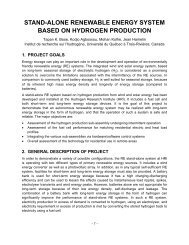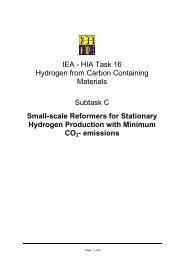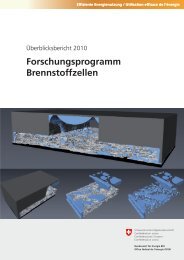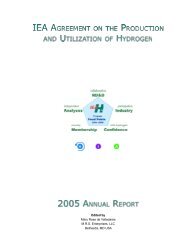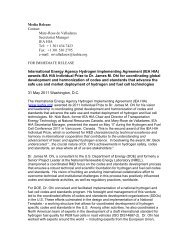Technology Status of Hydrogen Road Vehicles
Technology Status of Hydrogen Road Vehicles
Technology Status of Hydrogen Road Vehicles
You also want an ePaper? Increase the reach of your titles
YUMPU automatically turns print PDFs into web optimized ePapers that Google loves.
noticed....<br />
7. Environmental Impacts <strong>of</strong> <strong>Hydrogen</strong> <strong>Vehicles</strong><br />
The great attraction <strong>of</strong> hydrogen is pollution-free combustion...... <strong>Hydrogen</strong> vehicles would not produce,<br />
either directly or indirectly, significant amounts <strong>of</strong> CO, HCs, particulates, SO x, sulfur-acid deposition, ozone<br />
and other oxidants, benzene and other carcinogenic aromatic compounds, formaldehyde and other aldehydes,<br />
lead and other toxic metals, smoke, or CO 2 and other Greenhouse gases. The only pollutant <strong>of</strong> concern would<br />
be NO x. If hydrogen is made from water using a clean power source, then hydrogen production and<br />
distribution will be pollution-free. <strong>Hydrogen</strong> thus is a truly clean fuel.<br />
In this section, the environmental impacts <strong>of</strong> hydrogen production, distribution and end-use are reviewed with<br />
particular emphasis on the environmental impacts <strong>of</strong> using coal as a feedstock for hydrogen, NO x emissions<br />
from vehicles, and the Greenhouse effect <strong>of</strong> substituting hydrogen for gasoline and diesel fuel.<br />
Concerning hydrogen production and distribution, ..using clean solar power or other forms <strong>of</strong> renewable<br />
energy is essentially pollution-free.<br />
The manufacture <strong>of</strong> some solar energy-converting technologies produces small amounts <strong>of</strong> undesirable byproducts....<br />
Although solar-hydrogen plants are likely to be land-intensive, land requirements per se are not likely to be<br />
an important restriction on the development <strong>of</strong> solar hydrogen production.<br />
.......<br />
The use <strong>of</strong> coal to produce hydrogen would not be a desirable long-term option from an environmental<br />
standpoint: first, coal mining is environmentally damaging and dangerous; second, emissions from coal-tohydrogen<br />
plants may be significant and harmful; third, and most importantly, the use <strong>of</strong> coal inevitably<br />
releases large amounts <strong>of</strong> CO 2 and other trace Greenhouse gases.<br />
.......<br />
Concerning vehicular emissions, NO x is the only significant pollutant from hydrogen vehicles....(and) is<br />
undesirable for several reasons. First, it can cause acute and perhaps long-term respiratory ailments. Second,<br />
reactive hydrocarbons and NO x are involved in a complex series <strong>of</strong> chemical reactions that form ozone, a potent<br />
oxidant that damages plants and materials and also causes respiratory problems. Third, emissions <strong>of</strong> NO x form<br />
particulate nitrates, which reduce atmospheric visibility and, again, may have serious respiratory effects.<br />
Nitrates are the principal constituent <strong>of</strong> acid deposition in the Western U.S. Finally, NO x forms other toxic,<br />
mutagenic and carcinogenic compounds......<br />
Formation <strong>of</strong> NO x in any internal combustion engine is primarily a function <strong>of</strong> reaction temperature, and<br />
duration and available oxygen. Emissions <strong>of</strong> NO x increase with the combustion temperature, the length <strong>of</strong> the<br />
high-temperature combustion period, and the availability <strong>of</strong> oxygen, up to a point. There are several ways to<br />
control NO x in a hydrogen engine: run the engine very lean, which lowers the temperature, or very rich, which<br />
reduces the oxygen supply; decrease the burn time or lower the engine rpm (which allows for better heat<br />
dissipation); or cool the combustion environment by adding water or exhaust gases or using cryogenic fuel.<br />
From the (available) data, and theoretical discussions, several conclusions can be drawn:<br />
! optimized hydrogen vehicles can emit much less NO x than do comparable, optimized gasoline vehicles;<br />
! an optimized hydrogen vehicle could meet the current US NO x standard, and perhaps have lower lifetime<br />
average NO x emissions than a current-model catalyst-equipped gasoline vehicle, without after-treatment<br />
<strong>of</strong> the exhaust gas;<br />
! the NO x emissions deterioration rate probably would be lower for hydrogen vehicles than for gasoline<br />
vehicles;<br />
46



